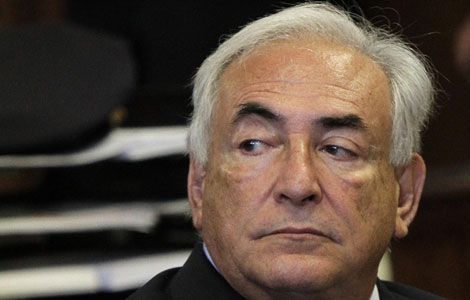China amends law to confiscate ill-gotten money
Updated: 2011-08-25 08:21
(Xinhua)
|
|||||||||||
BEIJING -?China's legislature will revise its Criminal Procedure Law to allow the confiscation of illegally-obtained money from corrupt officials and terrorists who have fled the country.
Draft amendments submitted Wednesday to the National People's Congress (NPC) Standing Committee, the country's top legislature, state that procuratorates can apply to courts to confiscate money from people who have been accused of major crimes related to corruption or terrorism, as long as the suspects are not seized within a year of their disappearance and as long as the confiscation is in accordance with China's constitution.
Such confiscations are "special procedures" that have been recently added to the law's draft amendments, which were reviewed for the first time at the NPC's bimonthly legislative session.
There are often cases where the property of corrupt officials and terrorists who have fled the country cannot be recovered for a long time, according to Professor Chen Weidong from the Law School of Renmin University of China.
"The confiscation of these illegal funds must be done in accordance with criminal proceedings. Trial by default is not allowed in China, so illegal funds belonging to runaway suspects have long been difficult to confiscate," Chen said.
The draft states that evidence for confiscation must be presented. Courts are permitted to seal, seize or freeze confiscated funds.
"Runaway officials have the ability to transfer their property, " said Professor Wang Jiancheng, vice president of the Peking University Law School.
According to Chinese law, it is much easier to confiscate illegal funds within the country's borders. However, if property is transferred overseas, confiscators must obtain relevant legal documents while seeking judicial assistance from other countries. Therefore, the Criminal Procedure Law should be revised to assist the confiscation process, Wang said.
The draft states that relatives of suspects, defendants and their lawyers, can file lawsuits to block confiscation efforts.
Confiscating illegal proceeds is "a special procedure made without convicting suspects," said Chen.
"It can better protect the country's interests, as we have a basis to refer to when we apply for judicial assistance from other countries," said Wang.
Last month, one of China's most wanted fugitives, Lai Changxing, was repatriated back to China 12 years after fleeing to Canada.
The 53-year-old alleged smuggling kingpin is the chief suspect in a multibillion-dollar smuggling operation that dates back to the 1990s in southeast China's city of Xiamen.
Lai transferred most of his money to overseas accounts before fleeing China with his family.
The Canadian government made active efforts in Lai's extradition, according to the Ministry of Public Security.
Police statistics in 2010 showed that there were nearly 600 Chinese suspects at large overseas, most of whom are wanted for economic crimes.
China's Criminal Procedure Law, adopted in 1979, was revised once in 1996 by the NPC Standing Committee.
Wednesday's draft amendments will be presented to the annual NPC plenary session next March, according to an official from the legislature.
- Live Report: Bounty for Gadhafi as fight rages
- Proposals to ban torture testimony
- Conoco to be sued over oil leak
- Watchdog suspected over toxic waste
- Russia, DPRK agree on nuke issues
- Moody's cuts Japan rating to Aa3
- Oil firm vows to clean up spills
- Live Report: Gadhafi says withdrawal tactical move
Hot Topics
Anti-Gay, Giant Panda, Subway, High Speed Train, Coal Mine, High Temperature, Rainstorm, Sino-US, Oil Spill, Zhu Min
Editor's Picks

|

|

|

|

|

|






